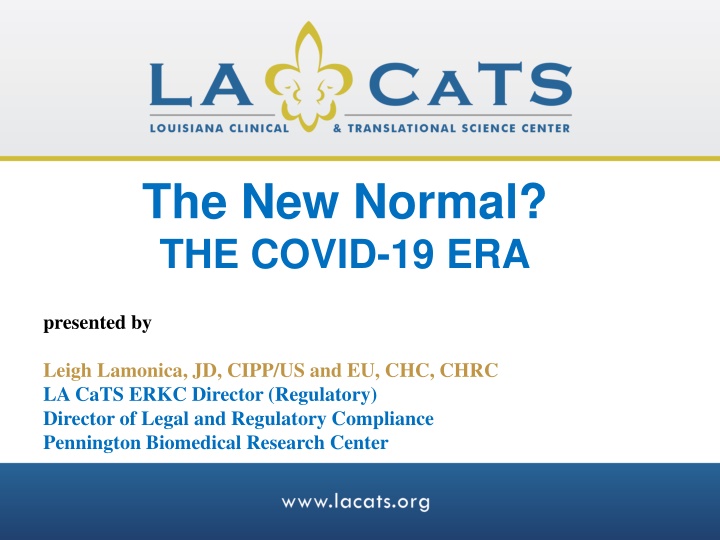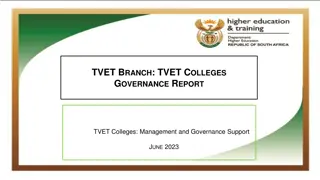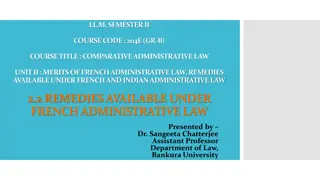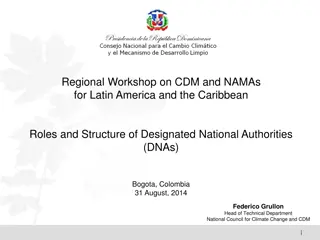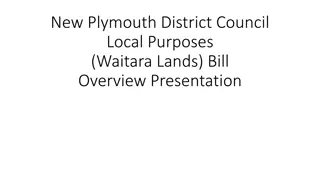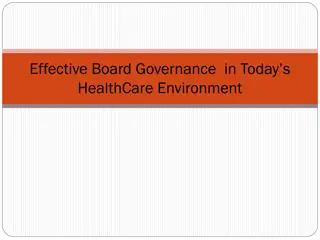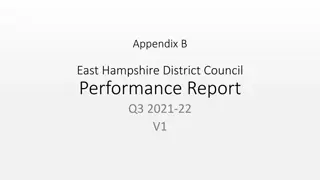Board Policy & Administrative Procedures for District Governance Council
This document outlines the Board Policy and Administrative Procedures for the District Governance Council, addressing the establishment of goals, implementation practices, and operational standards. It explains the roles of the Board, CEO, and Chancellor in setting and executing policies, procedures, and detailed guidelines for departmental operations within the District.
Download Presentation

Please find below an Image/Link to download the presentation.
The content on the website is provided AS IS for your information and personal use only. It may not be sold, licensed, or shared on other websites without obtaining consent from the author.If you encounter any issues during the download, it is possible that the publisher has removed the file from their server.
You are allowed to download the files provided on this website for personal or commercial use, subject to the condition that they are used lawfully. All files are the property of their respective owners.
The content on the website is provided AS IS for your information and personal use only. It may not be sold, licensed, or shared on other websites without obtaining consent from the author.
E N D
Presentation Transcript
The New Normal? THE COVID-19 ERA presented by Leigh Lamonica, JD, CIPP/US and EU, CHC, CHRC LA CaTS ERKC Director (Regulatory) Director of Legal and Regulatory Compliance Pennington Biomedical Research Center
Presentation Topics COVID-19 Impacts on Research IRB Reliance IRB Review Methods Refresher HIPAA Privacy & Security
COVID-19 Impacts on Research
Research Study Challenges COVID-related issues impacting research o Social distancing o Site & study closures o Travel limitations o Other operational considerations
Social Distancing Social distancing guidelines have impacted clinic visits for study participants o Less people in the waiting room at one time Reduction of visits able to be scheduled each day Available seating is limited and must be placed at least 6 feet apart o Masks required for participants and research staff o Limiting face-to-face time and in person visits when feasible
Site & Study Closures Site closures due to state mandate o Emergency stay-at-home order and Phase 1 & 2 restrictions In Phase 1, state and federal guidelines restricted non- essential visits and elective surgeries In Phase 2, limits on capacity and allowed procedures Sponsor-initiated study closures o Some study sponsors have their own guidelines for re-opening and proceeding with study visits, regardless of relaxed state restrictions o Must balance pressure from sponsors to re-open with compliance with local guidelines
Travel Limitations Restricted travel o Restrictions for states or parishes considered hot spots with a high number of cases may prevent participants who must travel from attending study visits This may lead to a need for participants to go to a local facility for safety labs Virtual Visits o Visits may need to be completed over the phone or HIPAA compliant platform Must check with IT to ensure the platforms are HIPAA compliant and set up properly.
Study Impacts Recruitment & study visits o Not enough personnel to conduct study visits due to illness or need to quarantine as a result of possible exposure/contact tracing o Restrictions on capacity as mandated by state officials limit the number of exam rooms that can be in use o Institutions may resort to halting recruitment or temporarily closing down some studies to manage the load due to restrictions o PPE shortages and interruptions to the supply chain for investigational products and other clinical supplies may lead to inability to conduct study visits
Study Impacts Limiting in-person visits o Stay-at-home orders issued by local government prevent in-person study visits from occurring Out-of-window visits Study drug delivery Safety labs o These lead to protocol deviations and/or modifications Institutions may be handling this differently, either requiring modifications or allowing flexibility with reporting deviations and COVID-related protocol changes Check with your institution for its policy
Study Impacts Considerations for trial participants becoming infected with COVID-19 o Many institutions have developed a screening process for trial participants This may occur prior to a visit and/or during a COVID-19 pre-screening questionnaire upon arrival for a study visit o Consult your institution regarding their policy in the case of a trial participant reporting a positive COVID- 19 test and/or exhibiting symptoms of COVID-19.
Study Impacts Possible solutions o In extreme circumstances, some possible solutions to maintain study procedures may be: Remote or electronic consenting Virtual study visits Home delivery and drive-up/contactless study drug dispensing
Remote Consenting Due to CDC social distancing guidelines, in some circumstances, remote consenting may be a solution. o Remote consenting by phone or video call- coordinator goes through consent just as they would in person Either mail-in, email, or drop off signed consent Conduct consenting over the phone prior to a required in- person visit and have participant sign at the visit to reduce face-to-face time Electronic consenting (e-consent) via HIPAA-compliant platforms For FDA studies electronic consenting must be done in 21CFR Part 11 and HIPAA compliant platforms
Remote Consenting When can it be appropriate to use remote consenting? o Survey studies o Focus groups o Studies with in-person assessments in an effort to reduce face-to-face interaction Written rules & waivers o Check your institution s policies regarding remote consenting, waivers of consent, and waivers of documentation related to COVID restrictions
FDA Flexibility in Research FDA Updates Guidance In Response To COVID-19 o Allows for consenting to be done remotely and signed consent forms to be returned in a variety of ways (remote consent is different from eConsent) o Unavoidable protocol deviations Greater flexibility with reporting and allowing protocol deviations related to COVID-19 o Alternative methods for safety assessments Phone contact, virtual visit, alternative location for assessment, including local labs or imaging centers
FDA Flexibility in Research FDA eConsent Guidance o Electronic informed consent may be used to either supplement or replace paper-based informed consent processes May be used for both on-site and remote access Must contain all elements of informed consent required by HHS and/or FDA regulations Should be easy for participants to navigate Should be presented appropriately and allow subjects enough time to dedicate to the eConsent process Identity verification using state-issued identification or other identifying documents Must include methods to ensure subjects are able to ask questions Electronic signatures must comply with all applicable requirements under 21 CFR part 11 Paper or electronic copy must be provided
Finding Balance Must balance providing flexibility to minimize risk/exposure without compromising data integrity, human subjects protections, and privacy rights
IRB Reliance Terms IRB of Record: (also known as the Lead, Reviewing, Central IRB, or Single IRB) means the IRB who is responsible for the review, approval, and regulatory oversight of a multi-site research study. Lead PI: The principal investigator with ultimate responsibility for the overall conduct, safety, regulatory oversight and data integrity for a multi-site research study. Relying Institution or Site: A hospital, clinic, doctor's office where research will take place and which will rely on an external IRB (Central IRB) which will serve as the Reviewing IRB for a multi-site study. When academic institutions are involved, this term incorporates the Relying IRB and the Relying Participating Institution. Relying Site Investigator: A Principal Investigator at the Relying Institution for a study that may be overseen by a Lead or an external IRB.
IRB Reliance Terms Master Reliance Agreement (MRA): A MRA can be utilized when multiple studies are ceding review to a specific external IRB. Master Agreements may be reciprocal in that signatory institutions can act as the site providing IRB review and oversight or the site relying. Master Reliance Agreements may be for a single protocol or a number of protocols and are negotiated on a case by case basis. MRA eliminates the need for separate IAAs and individual negotiation and documentation. The local IRBs can have master agreements in place with the following external reliance platforms: o Smart IRB o IRB Reliance Exchange (IREx)
IRB Reliance Exceptions OHRP Exceptions to Single IRB During Covid-19 o HHS fully expects use of single IRB where possible even during the COVID-19 public health emergency. o An exception to the requirement to use a single IRB is appropriate for the following category: Cooperative research: that is ongoing or initially reviewed by the IRB during the Coronavirus Disease 2019 (COVID-19) public health emergency, as declared by the Secretary of Health and Human Services at https://www.phe.gov/emergency/news/healthactions/phe/Pages/201 9-nCoV.aspx; where reliance on a single IRB would not be practical; and for which the HHS division supporting or conducting the research approves of the use of this exception. *This exception applies for the duration of the research.
IRB Review Methods Refresher
IRB Review IRB must review all projects that meet the definition of human subjects research. There are three major types of review: o 1. Exempt o 2. Expedited o 3. Full Board Only the IRB can determine the appropriate level of review.
IRB Review What does an exempt determination mean? o Exempt does not always mean exempt from all of the requirements of the Common Rule o They may be exempt from some of the federal regulations. However, they are not exempt from state laws, institutional policies, or the requirements for ethical research. Exempt = less than minimal risk Expedited = no greater than minimal risk Full Board = greater than minimal risk
HIPAA Privacy & Security
HIPAA Security & Data Knowing where data is and will be kept after the study is complete o This issue is relevant now and will continue to be relevant Post-Covid. o In most cases, this is asked on the initial study application. What happens if the location changes by the time the study is complete? Who needs to know this information? The investigator, institution, & IRB. This needs to be documented somewhere.
HIPAA Security & Data Why is it important to know where the data is located? o NIH Policy for Data Management and Sharing Effective January 25, 2023 Will require researchers to prospectively plan for how scientific data will be preserved and shared through the submission of a Data Management and Sharing Plan. o Clinicaltrial.gov and other registry reporting o HIPAA Patient s right to obtain their own data Requests for data from sponsors or the government Subpoenas o Technology Disclosures (Patents)
